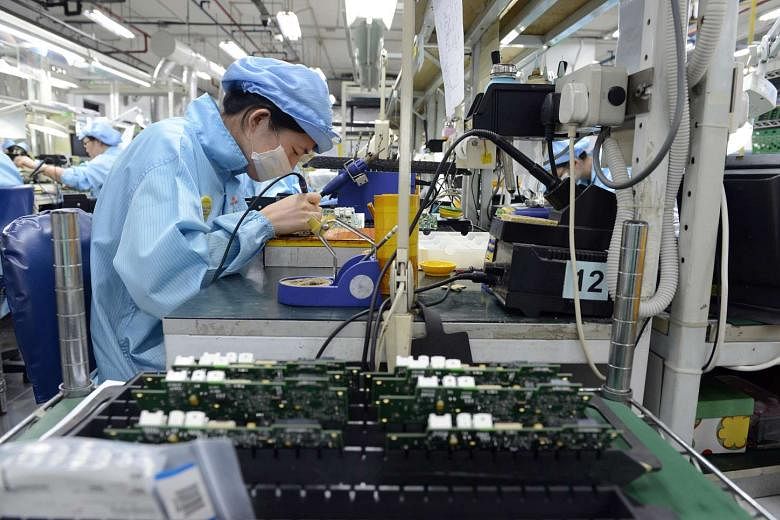SINGAPORE - Singapore's factories closed the year with a whimper as hiring, production and new demand all fell further in December, fresh data has shown.
The Purchasing Managers' Index (PMI) - an early indicator of manufacturing activity - contracted for a sixth straight month to post a reading of 49.5 in December, according to data from the Singapore Institute of Purchasing & Materials Management, out Monday (Jan 4).
A reading below 50 shows that more purchasing managers reported a deterioration in business than those noting an improvement.
Broadly, global demand for manufacturing has been weak.
But some economists are now worried that Singapore might be losing competitiveness as factories here appear to be stuck in the doldrums even as their overseas peers in the value-added segment are starting to see the first signs of a recovery.
South Korea and Taiwan each posted a December PMI of 50.7 and 51.7 on Monday, reversing months of contractions to reach levels of activity not seen since February, according to data compiled by Nikkei and Markit Economics.
"That leaves Singapore eating the dust," said UOB economist Francis Tan.
"The test will be in the next few months, if their PMIs strengthen and ours does not. Then we must ask, 'Is this the restructuring we intended where we don't mind losing out?'
I hope not to see Singapore's manufacturing output contract while our close competitors see green shoots."
The mood is dark even as manufacturers ring in the new year.
Mr CK Wong, managing director of oilfield equipment manufacturer HME Technologies, said: "The economic situation in 2016 will be worse than 2015. A lot of businesses will be affected. I expect the manufacturing activity in the marine and offshore engineering segment to slowly pick up in the last quarter of 2017."
Even the most optimistic economist forecasts for a manufacturing rebound this year are premised on a patchy economic recovery in the United States and a low base effect from the weak activity in 2015.
Credit Suisse economist Michael Wan said: "Compared with the region, we're losing competitiveness. That's been a trend for the last three, four years. As wage costs rise, I don't expect this trend to reverse.
This year you will probably see more companies continue to move out of Singapore to Malaysia, or the rest of Southeast Asia."
Last month's PMI was slightly higher than November's 49.2 reading, but DBS economist Irvin Seah warned that the uptick is not an upward trend but seasonal effects at play.
"There's nothing to cheer about. The pick-up is more likely due to manufacturers front-loading production ahead of the Lunar New Year lull period in February."
And while the Singapore economy may have grown more than expected in the fourth quarter going by Monday's advance estimate from October and November data, December's PMI cast a pall on most economists' outlooks.
Mr Tan said: "The PMI tells me that at least in the first half of 2016, manufacturing doesn't seem to be edging up."


